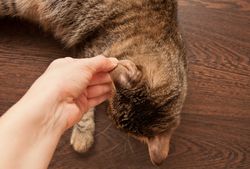How Pet Skin Problems Indicates Bigger Health Issues

From time to time, all animals will scratch or chew themselves to relieve itchy or irritated skin. But if your pet has persistent skin problems, you may want to talk to an animal skin care specialist. Through a comprehensive evaluation, your pet dermatologist can determine if symptoms are due to a minor skin issue or are connected to a larger health problem that requires treatment. Here are just a few reasons that additional treatment may be necessary to soothe your companion’s skin.
What Underlying Health Problems Can Complicate Animal Skin Care?
Pests
Whether they’re feeding on blood or using hair as shelter, many insects are known to gravitate toward pets. In many cases, skin problems are the first sign of an infestation.
For example, saliva from fleas can cause cats and dogs to scratch incessantly, lose hair, or develop scabs. Ticks, on the other hand, burrow into an animal’s skin causing redness and inflammation. Mange—a condition characterized by itchy skin, hair loss, redness, and body sores—can also occur if your four-legged friend is infested with parasitic mites.
When these problems surface, it’s important to have your pet treated immediately to kill and remove insects and their eggs. To prevent the issue from resurfacing, it’s also important to use prevention products—such as topical solutions that deter fleas and ticks.
Infections
 Skin infections can cause a variety of alarming symptoms, including discoloration, bleeding, persistent wounds, hair loss, discharge, itching, and odor. If you notice these signs, treatment is necessary to prevent the infection from spreading.
Skin infections can cause a variety of alarming symptoms, including discoloration, bleeding, persistent wounds, hair loss, discharge, itching, and odor. If you notice these signs, treatment is necessary to prevent the infection from spreading.
Some infections are due to bacteria, which contaminates the skin through a cut or other injury. Others may be due to fungi that the animal came into contact with outdoors, including those that cause ringworm or yeast infections.
Allergies
Certain substances can prompt autoimmune responses in animals, usually leading to dermatological allergy symptoms such as itchiness, hives, or swelling. Some environmental allergens that affect animal skin care include pollen, grass, and dust. Other flare-ups may be due to food allergies.
To help relieve these symptoms, you must first take your pet to a veterinarian for an allergy test. Once allergen sensitivities are noted, your specialist may provide treatment to help prevent flare-ups. In other cases, you may need to make certain lifestyle changes, such as using a new pet food or grooming products.
If you have concerns about animal skin care, turn to the caring professionals at Veterinary Dermatology Services in Cincinnati, OH. Specializing in pet dermatology, these doctors will pinpoint the cause of your companion’s symptoms and provide safe and effective treatment for relief. This clinic will also introduce you to solutions that can help you keep your pet’s skin healthy and prevent further complications. To learn more about the services they offer in the Ohio, Northern Kentucky, and Southern Indiana regions, visit the clinic online. You can also call (513) 489-4644 to schedule an appointment.
About the Business
Have a question? Ask the experts!
Send your question

